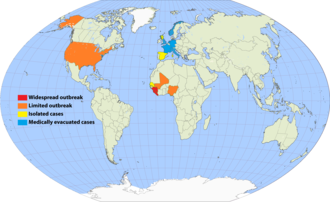Western African Ebola epidemic
(Redirected from West African Ebola virus epidemic)
Western African Ebola Epidemic
The Western African Ebola epidemic was a significant outbreak of the Ebola virus disease (EVD) that occurred in West Africa from 2013 to 2016. It was the most widespread outbreak of Ebola virus disease in history, causing major loss of life and socioeconomic disruption in the region.
Background
The Ebola virus is a filovirus that causes severe hemorrhagic fever in humans and other primates. The virus is transmitted to people from wild animals and spreads in the human population through human-to-human transmission. The average EVD case fatality rate is around 50%, but it can vary from 25% to 90% in past outbreaks.
Outbreak
The outbreak began in December 2013 in a small village in Guinea. The first cases were reported in the Guéckédou region, near the borders with Sierra Leone and Liberia. The virus spread rapidly to urban areas and across borders, leading to a widespread epidemic.
Affected Countries
The countries most affected by the epidemic were Guinea, Sierra Leone, and Liberia. These countries experienced widespread transmission of the virus, with thousands of cases and deaths reported.
Guinea
Guinea was the origin of the outbreak, with the first cases reported in December 2013. The virus spread from rural areas to the capital, Conakry, and other regions.
Sierra Leone
Sierra Leone reported its first cases in May 2014. The virus spread rapidly, affecting all districts of the country. The capital, Freetown, was heavily impacted.
Liberia
Liberia was severely affected, with the first cases reported in March 2014. The capital, Monrovia, experienced a high number of cases, overwhelming the healthcare system.
Response
The response to the epidemic involved local governments, international organizations, and non-governmental organizations. Efforts included setting up treatment centers, contact tracing, safe burials, and public health education.
International Involvement
The World Health Organization (WHO) declared the outbreak a Public Health Emergency of International Concern in August 2014. Various countries and organizations provided support, including the deployment of healthcare workers and military personnel to assist in the response.
Challenges
The response faced numerous challenges, including inadequate healthcare infrastructure, cultural practices, and community resistance. Misinformation and fear also hindered efforts to control the outbreak.
Impact
The epidemic had a profound impact on the affected countries, with over 28,000 cases and more than 11,000 deaths reported. The healthcare systems were overwhelmed, and the economies of the affected countries suffered significant setbacks.
Recovery and Lessons Learned
Post-epidemic recovery efforts focused on rebuilding healthcare systems, improving disease surveillance, and strengthening public health infrastructure. The epidemic highlighted the need for global preparedness and rapid response to infectious disease outbreaks.
Related Pages
Gallery
Transform your life with W8MD's budget GLP-1 injections from $125.
W8MD offers a medical weight loss program to lose weight in Philadelphia. Our physician-supervised medical weight loss provides:
- Most insurances accepted or discounted self-pay rates. We will obtain insurance prior authorizations if needed.
- Generic GLP1 weight loss injections from $125 for the starting dose.
- Also offer prescription weight loss medications including Phentermine, Qsymia, Diethylpropion, Contrave etc.
NYC weight loss doctor appointments
Start your NYC weight loss journey today at our NYC medical weight loss and Philadelphia medical weight loss clinics.
- Call 718-946-5500 to lose weight in NYC or for medical weight loss in Philadelphia 215-676-2334.
- Tags:NYC medical weight loss, Philadelphia lose weight Zepbound NYC, Budget GLP1 weight loss injections, Wegovy Philadelphia, Wegovy NYC, Philadelphia medical weight loss, Brookly weight loss and Wegovy NYC
|
WikiMD's Wellness Encyclopedia |
| Let Food Be Thy Medicine Medicine Thy Food - Hippocrates |
Medical Disclaimer: WikiMD is not a substitute for professional medical advice. The information on WikiMD is provided as an information resource only, may be incorrect, outdated or misleading, and is not to be used or relied on for any diagnostic or treatment purposes. Please consult your health care provider before making any healthcare decisions or for guidance about a specific medical condition. WikiMD expressly disclaims responsibility, and shall have no liability, for any damages, loss, injury, or liability whatsoever suffered as a result of your reliance on the information contained in this site. By visiting this site you agree to the foregoing terms and conditions, which may from time to time be changed or supplemented by WikiMD. If you do not agree to the foregoing terms and conditions, you should not enter or use this site. See full disclaimer.
Credits:Most images are courtesy of Wikimedia commons, and templates, categories Wikipedia, licensed under CC BY SA or similar.
Translate this page: - East Asian
中文,
日本,
한국어,
South Asian
हिन्दी,
தமிழ்,
తెలుగు,
Urdu,
ಕನ್ನಡ,
Southeast Asian
Indonesian,
Vietnamese,
Thai,
မြန်မာဘာသာ,
বাংলা
European
español,
Deutsch,
français,
Greek,
português do Brasil,
polski,
română,
русский,
Nederlands,
norsk,
svenska,
suomi,
Italian
Middle Eastern & African
عربى,
Turkish,
Persian,
Hebrew,
Afrikaans,
isiZulu,
Kiswahili,
Other
Bulgarian,
Hungarian,
Czech,
Swedish,
മലയാളം,
मराठी,
ਪੰਜਾਬੀ,
ગુજરાતી,
Portuguese,
Ukrainian
Contributors: Prab R. Tumpati, MD






